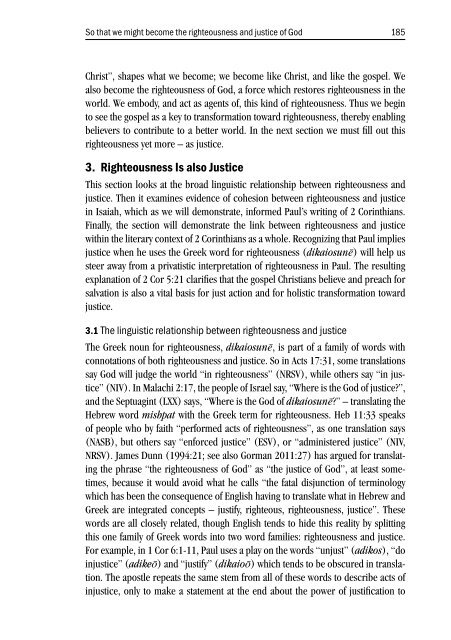Acquiesce to Righteousness
Acquiesce to Righteousness
Acquiesce to Righteousness
Create successful ePaper yourself
Turn your PDF publications into a flip-book with our unique Google optimized e-Paper software.
So that we might become the righteousness and justice of God 185<br />
Christ”, shapes what we become; we become like Christ, and like the gospel. We<br />
also become the righteousness of God, a force which res<strong>to</strong>res righteousness in the<br />
world. We embody, and act as agents of, this kind of righteousness. Thus we begin<br />
<strong>to</strong> see the gospel as a key <strong>to</strong> transformation <strong>to</strong>ward righteousness, thereby enabling<br />
believers <strong>to</strong> contribute <strong>to</strong> a better world. In the next section we must fill out this<br />
righteousness yet more – as justice.<br />
3. <strong>Righteousness</strong> Is also Justice<br />
This section looks at the broad linguistic relationship between righteousness and<br />
justice. Then it examines evidence of cohesion between righteousness and justice<br />
in Isaiah, which as we will demonstrate, informed Paul’s writing of 2 Corinthians.<br />
Finally, the section will demonstrate the link between righteousness and justice<br />
within the literary context of 2 Corinthians as a whole. Recognizing that Paul implies<br />
justice when he uses the Greek word for righteousness (dikaiosunē) will help us<br />
steer away from a privatistic interpretation of righteousness in Paul. The resulting<br />
explanation of 2 Cor 5:21 clarifies that the gospel Christians believe and preach for<br />
salvation is also a vital basis for just action and for holistic transformation <strong>to</strong>ward<br />
justice.<br />
3.1 The linguistic relationship between righteousness and justice<br />
The Greek noun for righteousness, dikaiosunē, is part of a family of words with<br />
connotations of both righteousness and justice. So in Acts 17:31, some translations<br />
say God will judge the world “in righteousness” (NRSV), while others say “in justice”<br />
(NIV). In Malachi 2:17, the people of Israel say, “Where is the God of justice?”,<br />
and the Septuagint (LXX) says, “Where is the God of dikaiosunē?” – translating the<br />
Hebrew word mishpat with the Greek term for righteousness. Heb 11:33 speaks<br />
of people who by faith “performed acts of righteousness”, as one translation says<br />
(NASB), but others say “enforced justice” (ESV), or “administered justice” (NIV,<br />
NRSV). James Dunn (1994:21; see also Gorman 2011:27) has argued for translating<br />
the phrase “the righteousness of God” as “the justice of God”, at least sometimes,<br />
because it would avoid what he calls “the fatal disjunction of terminology<br />
which has been the consequence of English having <strong>to</strong> translate what in Hebrew and<br />
Greek are integrated concepts – justify, righteous, righteousness, justice”. These<br />
words are all closely related, though English tends <strong>to</strong> hide this reality by splitting<br />
this one family of Greek words in<strong>to</strong> two word families: righteousness and justice.<br />
For example, in 1 Cor 6:1-11, Paul uses a play on the words “unjust” (adikos), “do<br />
injustice” (adikeō) and “justify” (dikaioō) which tends <strong>to</strong> be obscured in translation.<br />
The apostle repeats the same stem from all of these words <strong>to</strong> describe acts of<br />
injustice, only <strong>to</strong> make a statement at the end about the power of justification <strong>to</strong>

















